Global Ecology Institute
Notice: The institute and all of its co-workers are on sabbatical starting July 2020. We need time to reassess our priorities and reform new working teams to address the critical ecological issues of our times. Unfortunately, this means nobody is available to answer your inquiries until further notice. We thank you for your understanding.
Between 2010 and 2020, our ecological institute, led by Bernd W. Mueller, worked to weave a network of cooperation and research partners centered around the New Water Paradigm, for restoring natural water cycles and climate. The institute provided education and consultations to projects in our region and across the world. Responding to the ecological catastrophes unfolding worldwide, we focus on decentralized model solutions like the Global Action Plan.
Ecology Work in Tamera
A key inspiration guiding us is Viktor Schauberger (1885–1958) and his groundbreaking research into the motion of water. We study his findings and try to apply them, as much as already possible, in our ecological work.
Since Sepp Holzer inspired us with the vision of the Water Retention Landscape, we’ve applied rainwater retention measures all over Tamera. On the basis of natural and decentralized water management, we’ve become regenerative in our water consumption, and work on food sovereignty, using permaculture principles and agroecology techniques.
As we focus on the paradigm shift from exploiting nature to cooperating with her, we closely work with Terra Deva, our department for spiritual ecology.
We’re also supporting the Swiss artist Felix Hediger to develop a new type of water pump operating according to Schauberger principles, e.g. aligned with the natural motion patterns of water.
In this three-minute video produced by Re/Culture Media in 2017, Bernd Mueller speaks about the consciousness of water – and how healing water is related to healing human relationships.
Global Network
Between 2011 and 2016, we hosted an annual International Water Symposium in Tamera, bringing together experts, decision makers, journalists and activists to look at regenerative alternatives in water management and how they can restore the climate and provide an answer to global water, food and fire catastrophes. Read some of the reports:
With the symposia, we developed a circle of research and cooperation partners, including:
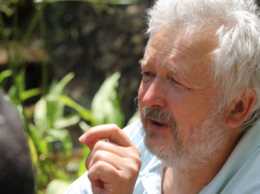
Michal Kravčík
Michal Kravčík, Slovakian water engineer, who ran a nationwide campaign for ecosystem restoration in Slovakia, implementing tens of thousands of decentralized rainwater retention measures. He’s written several books and is co-author of the New Water Paradigm and the Global Action Plan.
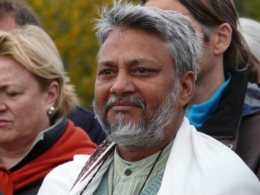
Rajendra Singh
Rajendra Singh, the Indian “water man,” who restored 6,500 km² of desert in Rajasthan, by mobilizing villagers to apply rainwater retention measures, thus allowing 100,000 people to gain regenerative self-sufficient access to water and food.
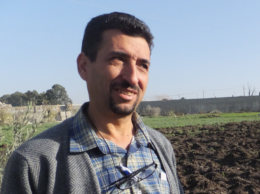
Saad Dagher
Saad Dagher, Palestinian agroecology leader, permaculture teacher and peace activist, working in the West Bank with the Farkha ecovillage, among many other projects.
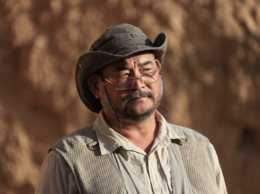
John D. Liu
John D. Liu, the Chinese-American filmmaker, ecosystem restoration researcher and educator, founder and director of the Environmental Education Media Project (EEMP), known for his documentary film, “Hope in a Changing Climate.”
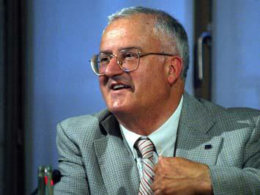
Professor Millán M. Millán
Professor Millán M. Millán, Spanish meteorologist and executive director of Fundación CEAM, who has done groundbreaking research revealing how changes in local water management affect regional and global weather patterns.
In 2015, Michal Kravčík and Jan Lambert published the Global Action Plan for the Restoration of Natural Water Cycles and Climate, and presented it at the UN Climate Summit in Paris, showing how we can globally reverse climate change and its catastrophic effects by introducing measures for retaining rainwater locally. We collaborate with Michal Kravčík, the Global Ecovillage Network and others on promoting the plan.
Against this background, we’ve increasingly worked in our region – aiming to build a watershed community taking responsibility for our common water resource. Inspired by Rajendra Singh, we accompanied Walking Water in California in 2015–17, and led a first water pilgrimage along our watershed in fall 2016. We followed the water’s way from our spring at Tamera all the way to the mouth of the Sado river at Setúbal, stepping into intimate relation with nature, animals and people, learning about their needs and promoting the Global Action Plan in our region.
Education
In the past years, we’ve offered training for a deeper understanding of the New Water Paradigm in various formats – through seminars, Water Retention Landscape Design courses and educational building sites.
Consultations
On request, we provide consultations on ecosystem restoration to partners in our global network. Bernd Mueller has worked in Portugal, Spain, Colombia, Bolivia, the USA, Israel, Palestine, Haiti, Kenya and more.
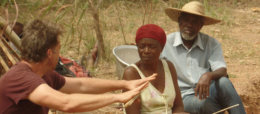
Haiti
When consulting the British aid organization CAFOD in Haiti in 2013, our goal was to identify ways to improve the provision of sustainable water and sanitation support to people living in crisis and extreme poverty. We visited a settlement reconstruction site established after the 2010 earthquake and produced a report, concretely showing how such a settlement could be designed according to regenerative principles.
Kenya
Later in 2013, we reviewed the watershed management plan of the Muvitha Kathemboni watershed. The central question was: how can people in the countryside learn again to cooperate with nature, after having lost their relationship with it? We developed a report including:
- sustainable water management as the basis for rural and urban planning
- a proposal for long term engagement, models and regenerative water management
- education programs for sustainable and community based infrastructure and land use.
We continue to collaborate with CAFOD on strategies for providing genuine sustainable assistance in crisis areas.
International Recognition
- European Commission: The Community Research and Development Information Service produced a report on Climate Impact Research Coordination for a Larger Europe that describes Tamera as one of 22 exemplary projects for climate change adaptation to inspire European citizens.
- BASE – Bottom-up Climate Adaptation Strategies Towards a Sustainable Europe produced the report: Water retention landscape to restore the water cycle and reduce vulnerability to droughts, which focuses on a cost-benefit analysis of our ecological work.
- “The Guardian” wrote about our work on March 7th 2017: Arid land to a fertile Eden: permaculture lessons from Portugal
- Fundação da Faculdade de Ciências da Universidade de Lisboa (FFCUL) produced a Case Study of the European Climate Adaptation Platform: Tamera water retention landscape to restore the water cycle and reduce vulnerability to droughts
- Honorable Mention in the Buckminster Fuller Challenge, a whole systems design award, in 2012.
Explore in Depth
Invisible
Our Publications
- The New Water Paradigm: Global Climate and Ecosystem Restoration by Bernd Mueller, 2016
- The Secret of Water as a Basis for the New Earth: Healing the Water Cycle through the Creation of Water Retention Landscapes by Bernd Mueller, 2011
- Water: The Missing Link for Solving Climate Change by Leila Dregger and Martin Winiecki, 2015
- Healing Water and Healing Love by Sabine Lichtenfels
- Landscape Healing and Community interview with Bernd Mueller by Yael Marantz, 2016
- The Politics of Water by Bernd Mueller, 2016
Reports of Our Events and Consultations
Publications of Partners
- Global Action Plan for the Restoration of Natural Water Cycles and Climate by Michal Kravčík and Jan Lambert, 2015
- Soil and Water: a larger-scale perspective by Prof. Millán Millán, EU Commission Science for Environmental Policy report, 2015 and summary by Helena Laughton
- Productive Ecological Sewage Water Treatment Systems by Paulo Mellet, 2013
- Hope in a Changing Climate – documentary film by John D. Liu, 2009
Academic Publications
- Jakob Kadura, Bachelor Thesis (2016): Impact of Rainwater Harvesting on the Water Balance in the Area of Monte do Cerro, Portugal
- Sarah Daum, Master Thesis (2014): Water quality and sustainability of the Water Retention Landscape at Tamera ecovillage, south Portugal
- Jochen Baumgärtner, Bachelor Thesis (2012): Reforestation techniques in the Mediterranean – woody plant propagation and establishment

